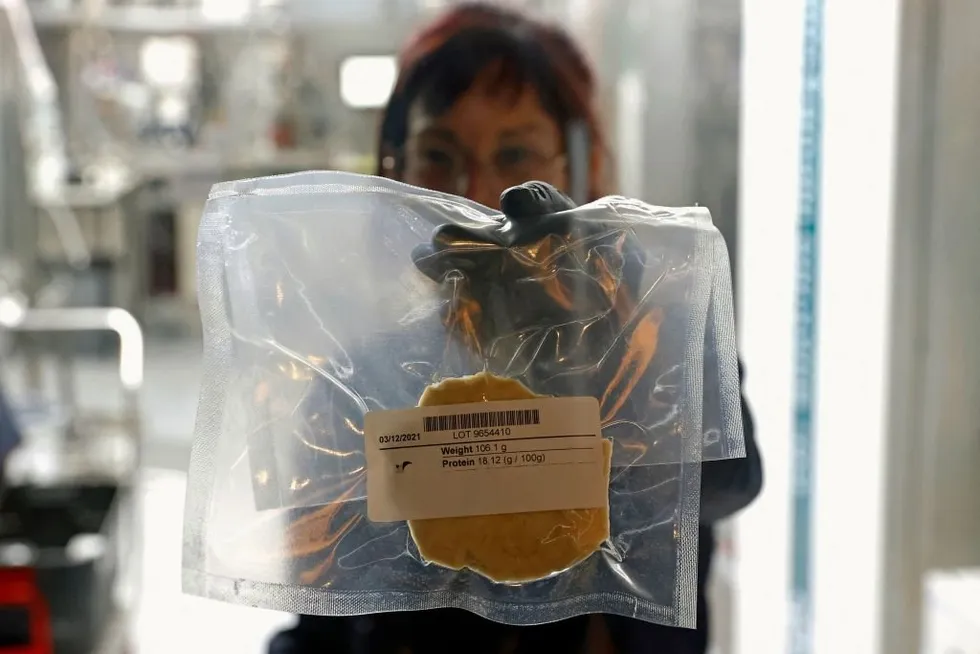DeSantis’ ban on lab-grown meat is peak culture war

Florida Gov. Ron DeSantis (R) will not live in the pod, and he will not eat the bugs. In fact, he will make sure no one in Florida ever does — even if they want to.
Last week, the governor signed SB 1084, making Florida the first U.S. state to ban “lab-grown meat” for consumers. Despite a fresh federal seal of approval for the chicken variety of cultivated meat, DeSantis has taken it upon himself to remove the consumer’s choice for these meat alternatives in the name of combating the “globalists” of the World Economic Forum.
It’s true that meat consumption has its enemies, some in very high places. But does that require a ban on innovation and commerce for meat alternatives?
It’s talk radio and Reddit politics turned into real-world law.
The bill does several things, such as offering excused absences from school for kids participating in agricultural track programs like 4-H and Future Farmers of America, and prohibits “the manufacture for sale, holding or offering for sale, or distribution of cultivated meat in this state.”
Violations are punishable by up to 60 days in jail, and restaurants that sell or serve these products risk losing their licenses to operate.
What exactly did Florida ban?
It’s important to understand that there are two emerging alternatives to good old-fashioned meat.
Plant-based meat, popularized by Impossible Foods and Beyond Meat, are grown from plant-cells and processed proteins to replicate the aroma and juices found in natural meat. The “blood” is a soy leghemoglobin compound, and for a vegetarian who misses eating meat, this makes plant-based meat extra appealing.
The more recent innovation in animal-cell-derived meats are grown, or cultivated, in a lab. It does not pass the vegetarian metric of involving any animals, so it could potentially find a market with omnivorous consumers and vegetarians who simply object to any animal suffering of any kind in the process of food production.
DeSantis’ crackdown applies to animal-cell derived products, not the more well-known plant-based brands that are now standard fare in McDonald’s, Burger King, IHOP, and several other chains that have partnered with Impossible Foods or Beyond Meat to offer menu alternatives. Not every partnership has stood the test of time or had a positive consumer response.
I’m a meat guy. My body and spirit require regular infusions of farm-fresh steak to operate at full capacity. I’ve tried out the plant-based meat products for the novelty, ordering Impossible Burgers on occasion at Red Robin’s in Manassas, Virginia, where they’re on the menu. If the Peruvian chicken place down the street in Manassas added Upside Foods’ cultivated chicken to the menu, I’d want to try it. Should this be a crime?
Shifts in consumer demand
When it comes to the plant-based meat stand-ins, one reason for their rocky market performance is that they tend to be more expensive than both the beef and bison burger options on restaurant menus and also less tasty. But they aren’t bad.
Cultivated chicken and yet-to-be-approved beef products face the same uphill battle of lowering the price per pound to be competitive with consumers. The goal is to hit $2.92 per pound, according to Leticia Goncalves, president of global foods at Archer-Daniels-Midland. Global trends in food production and trade are making this hard to achieve.
DeSantis speaks about the ban on lab-grown foods as if there’s an imminent threat in the market to good old-fashioned meat.
“They (the World Economic Forum) want to basically eliminate meat, they want to eliminate cattle, they want to eliminate chickens, all this stuff, and they want to create protein in laboratories,” the governor said on May 1. “So, it’s essentially lab-created meat. And their goal is to get to a point where you will not be raising cattle, you will not be developing meat like we’ve been doing for hundreds and hundreds of years in the state of Florida.”
It’s true that many environmentalists have identified factory farming and cattle as primary drivers of greenhouse gas emissions. It’s also true that meat consumption has its enemies, some in very high places. But does that require a ban on innovation and commerce for meat alternatives? Should a reluctant vegetarian, of which there are many, who wants to enjoy guilt-free bacon cheeseburgers in Florida be denied the freedom to enjoy a lab-grown meat option?
Younger generations have bucked many long-running trends ranging from wine and beer consumption to rejecting classic soda styles. They want stronger flavors and everything to be fizzy or fruity. Gen Z’s tastes may converge with previous generations, but it’s also possible that beer and wine might actually be in real long-term trouble with the rise of cannabis and hard seltzers as relaxation alternatives.
Weird coalitions form
Are these industries also going to be protected because centuries-old industries like cattle ranching are being shielded from future competition with the ban on lab-grown meats? That will depend on if Bill Gates and Klaus Schwab come out against beer at the next Davos summit, in strong enough terms to make it part of the culture war that DeSantis is so attuned to.
Even Sen. John Fetterman (D-Penn.) joined in with the plaudits against consumer choice, saying of Florida’s ban, “As a member of @SenateAgDems and as some dude who would never serve that slop to my kids, I stand with our American ranchers and farmers.”
There are many edible substances I’m disgusted by that will never be served at my dinner table, including baked beans, cauliflower, and Pennsylvania’s bizarre “scrapple” German mystery meat, but I’m not sure where I’d get off banning it for everyone. I might start by pointing out that Klaus Schwab of the WEF is German. Coincidence?
Why this is happening is no secret. The cattle ranching industry wants to smother the potential for meat alternatives, likely because it sees Gen Z habits including Meatless Mondays and “flexitarian” diets as something that will only grow in the decades ahead. Younger consumers may well respond to an alternative to factory-farmed meat, even if it’s grown in a lab.
Demand for meat will never go away, but it could recede, and cattle levels are at a low point not seen since 1951. Domestic demand and supply are down, and foreign imports are up.
The association’s “Florida Cow PAC” has given $75,000 to DeSantis since 2017 and another $72,000 to the Florida Republican Senatorial Campaign Committee. Many key legislators and Florida’s agriculture commissioner have received maximum contributions.
Every industry does this, but the Florida Cattlemen’s Association presumably had the political savvy to appeal to DeSantis’ online nature and sell this as a move against the globalists and Greta Thunberg cultists in the European Union. It isn’t cronyism. It’s a middle finger to the private jet people who want you to “own nothing and be happy.” Own the libs with American beef.
DeSantis has shown with his new ban on lab-grown meat in Florida that he only trusts consumers and freedom of choice so long as it doesn’t disrupt the status quo. If the tofu-slinging globalists do ever come for farm fresh meat, I’ll stand shoulder-to-shoulder with anyone in defense of naturally sourced chicken, beef, and sausage. But that time is not now, and Florida just betrayed its rebellious, live-and-let-live image in favor of protectionism for the meat lobby.







